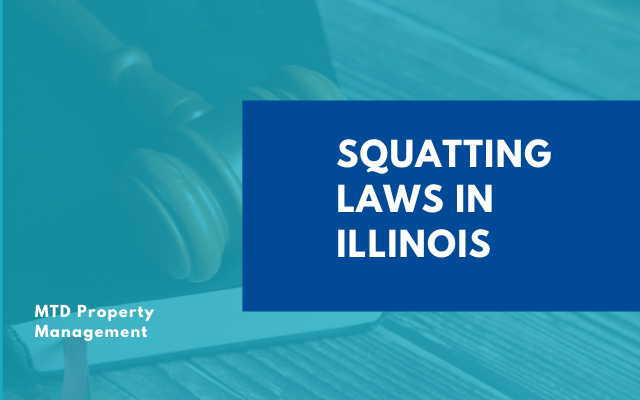Squatting Laws in Illinois - An Overview
As a landlord in Illinois, it’s essential to acquaint yourself with squatter’s rights to prevent a stranger from claiming ownership of your property.
Squatters have rights in Illinois. If they meet all requirements under Illinois’ Adverse Possession laws, a squatter may have a legal claim to your property. If they do have a claim as a squatter and obtain full legal rights to your property, you won’t receive any rent payments or other compensation.
The following are answers to commonly asked questions regarding squatter’s rights in the state of Illinois:
What is a Squatter?
Simply put, a squatter is an individual who lives on someone else’s property without the property owner’s permission. Adverse possession laws allow squatters to obtain ownership of the property they have been residing in so long as they meet all legal requirements.
Why do Squatter's have Rights?
Outrageous, right? But here’s the thing, squatters would be subject to vigilante justice in the absence of a law to protect them. If a landlord was allowed to use or threaten violence to get rid of a squatter, the situation could quickly escalate and become dangerous for everyone involved.
What Requirements must a Squatter meet in Illinois to Obtain Full Legal Rights to a Property?
1. The squatter must reside on the property for at least 20 years
A squatter seeking to file an Adverse Possession Claim must live on the property for a minimum amount of time. In Illinois, it takes a squatter 20 years of continuous possession to claim a property adversely (735 ILCS § 5/13-101 et seq).

The period of occupancy must be uninterrupted. This means the squatter must not have, at any point, abandoned the property.
2. The squatter must occupy the property physically
In addition to physically occupying the property, a squatter must treat the property as the actual owner would. This can be achieved through improving or beautifying the property.
3. The squatter’s occupation of the property must be obvious
A squatter seeking to make an adverse possession claim must not try to hide that they are living on the property. Their occupation must be obvious to anyone. Even the legal owner should be able to tell that someone is living on their property.
4. The occupation must be hostile
In property law, the term ‘hostile’ isn’t defined as danger or violence. Legally, hostile is defined in three ways.
The first definition is Simple Occupation. In this case, the person trespassing on a property doesn’t necessarily know that the property they are living on belongs to someone else. The state of Illinois interprets and defines hostile occupation in this way.
The second definition is Awareness of Trespassing. It requires the trespasser to be aware that their actions amount to trespassing.

Last but not least, hostile can be defined as a Good Faith Mistake. Only a few of states follow this definition. It requires the trespasser to make a Good Faith Mistake in occupying the property. Examples of this include their reliance on an incorrect or invalid deed.
Is Color of Title Required for an Adverse Possession Claim in Illinois?
Color of Title refers to a document that appears to be a legitimate claim to a piece of land, but it’s not. Some states require a Color of Title as a requirement for filing an Adverse Possession Claim while others don’t.
The state of Illinois belongs to the latter group. But, while a Color of Title may not be required for an adverse possession claim, having one can decrease the required timeframe for a squatter’s continuous occupation. A squatter that has this document only needs to occupy the property for seven continuous years rather than the usual 20.
Do Squatters have to Pay Property Taxes to Qualify for an Adverse Possession Claim?
In Illinois, payment of property taxes isn’t a requirement under Adverse Possession laws. That notwithstanding, if a squatter has been paying property taxes, they may be able to reduce the time of occupation required to file an Adverse Possession Claim.

Just like having a Color of Title, if squatters are paying property taxes, they may only need seven years of occupation rather than the regular 20 years required under adverse possession laws.
How to Stop Squatters from Claiming Your Property
As a landlord in Illinois, there are certain steps you can take to prevent a squatter from occupying or gaining ownership of your rental property.
- If your property is vacant, have it secured. Block all entrances and consider installing CCTV cameras or other security measures
- Inspect your property as often as you can
- Put highly visible “No Trespassing” signs throughout your property
- Issue any squatters a
written notice to vacate the premises as soon as you notice their presence
- If the squatter doesn’t move out after the notice period expires, consider giving them the option to rent the property
- Seek professional legal help if the squatter refuses to follow your demands
- Hire an experienced property manager to help you find a reliable tenant to fill vacancies in your rental property
How Do You Get Rid of Squatters in Illinois?
Illinois doesn’t have specific laws related to removing squatters from properties. As such, you must follow the state of
Illinois’ legal eviction process. Basically, you take the same steps that you would if you were removing a problem tenant.

The first step involves serving an eviction notice. In Illinois, there are three kinds of eviction notices:
- 5-Day Notice to Pay Rent
- 10-Day Notice to Quit
- Unconditional Quit Notice.
In a situation involving a squatter, the most appropriate notice to serve is the 5-Day Notice to Pay Rent. In the notice, make sure to state the amount of rent that the squatter must pay to continue occupying the unit. Obviously, you shouldn’t expect the squatter to make any payments, but after the 5 days are over, you can file for an eviction.
Since the squatter doesn’t have any legitimate reason to occupy your property, the judge will likely rule in your favor. Even in this case, it is illegal for you to carry out a self-eviction. Only a Sheriff or Constable has the authority to physically remove a squatter from your property.
Bottom Line
At
MTD Property Management, we’re well-versed in Illinois property laws. If you hire us, we’ll ensure your property is cared for and occupied by top-quality tenants! Get in touch with us to learn more about the services we offer.










